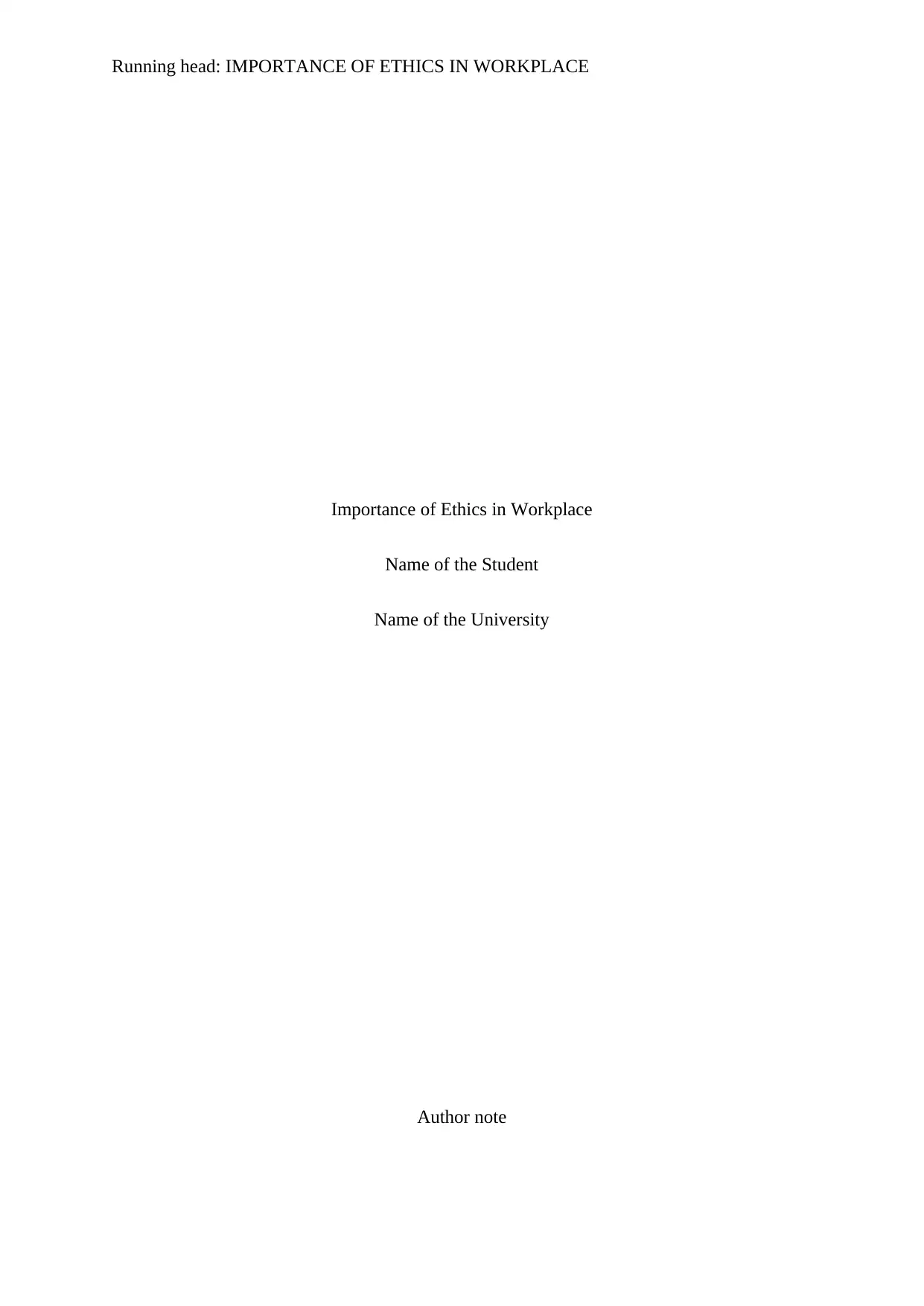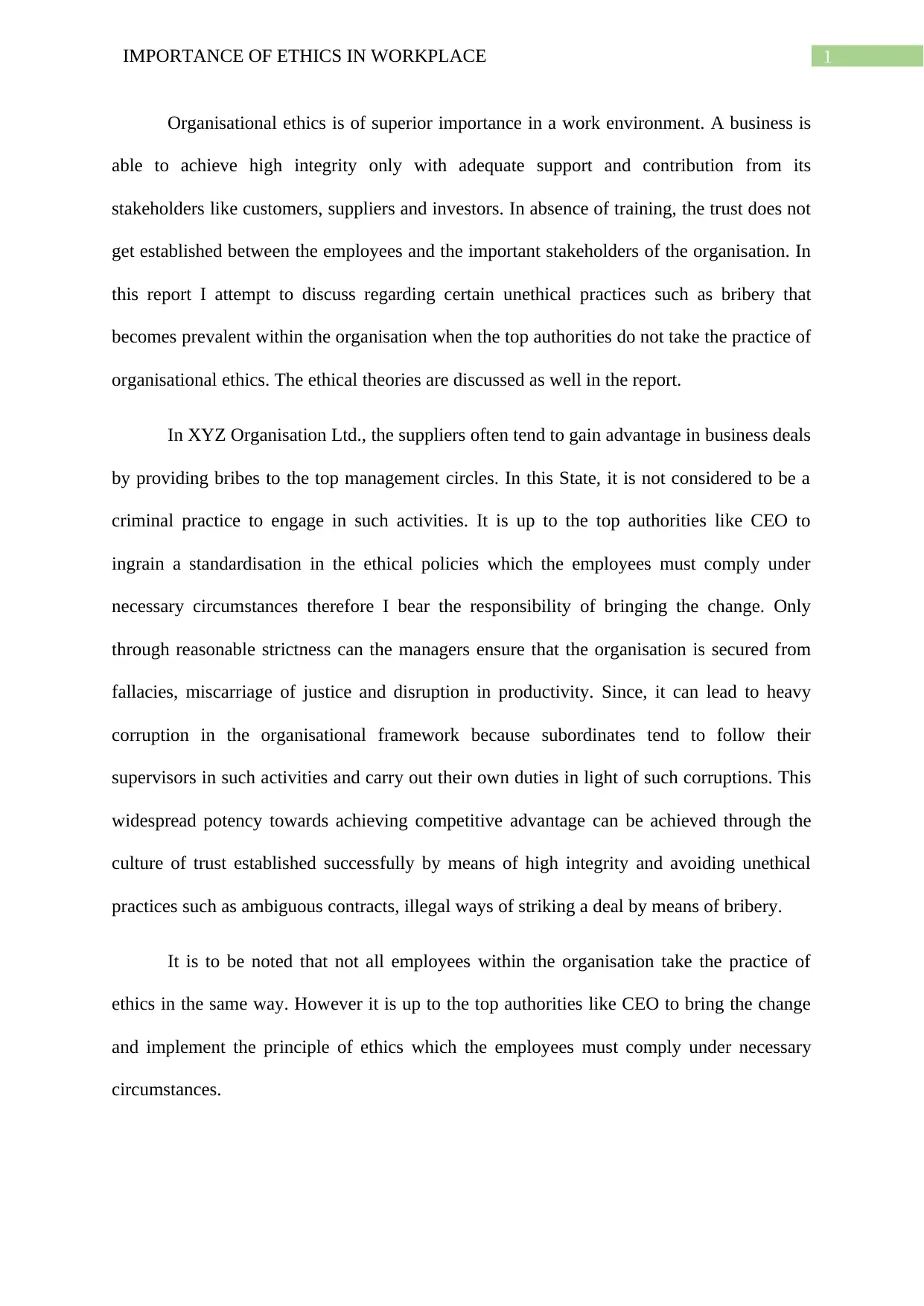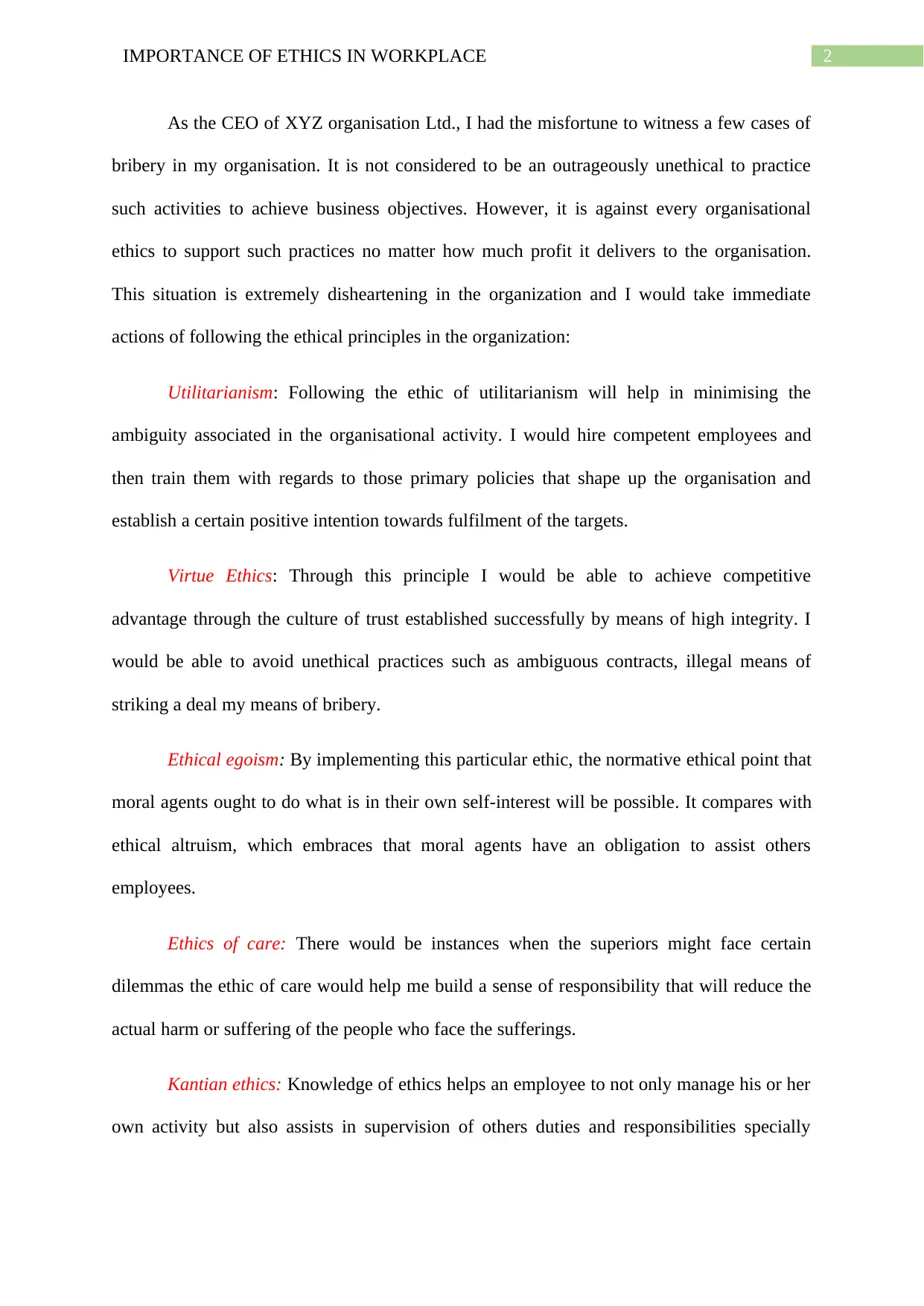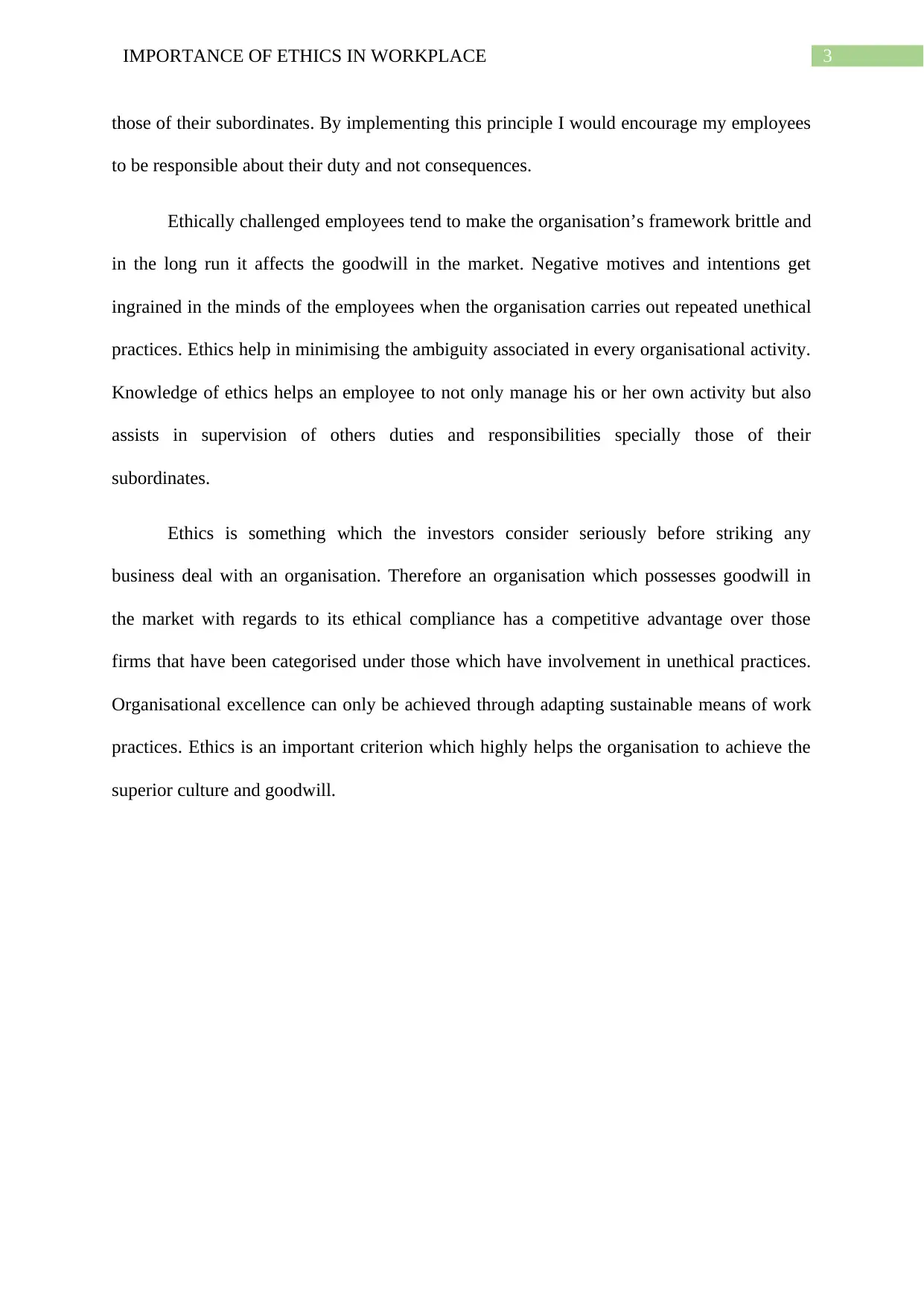Importance of Ethics in the Workplace: A CEO's Perspective Report
VerifiedAdded on 2023/06/03
|4
|877
|488
Report
AI Summary
This report delves into the critical importance of ethics within the workplace, particularly addressing the issue of bribery within XYZ Organization Ltd. The author, acting as the CEO, highlights the detrimental effects of unethical practices on organizational integrity and stakeholder trust. The report discusses the significance of ethical policies and the role of leadership in establishing and enforcing them. It explores various ethical theories, including utilitarianism, virtue ethics, ethical egoism, ethics of care, and Kantian ethics, and how they can be applied to minimize ambiguity, promote trust, and foster a responsible work environment. The report emphasizes the importance of ethical compliance for maintaining a competitive advantage, minimizing negative impacts, and achieving organizational excellence. The author outlines a commitment to implementing strict ethical standards to combat corruption and ensure long-term success.

Running head: IMPORTANCE OF ETHICS IN WORKPLACE
Importance of Ethics in Workplace
Name of the Student
Name of the University
Author note
Importance of Ethics in Workplace
Name of the Student
Name of the University
Author note
Paraphrase This Document
Need a fresh take? Get an instant paraphrase of this document with our AI Paraphraser

1IMPORTANCE OF ETHICS IN WORKPLACE
Organisational ethics is of superior importance in a work environment. A business is
able to achieve high integrity only with adequate support and contribution from its
stakeholders like customers, suppliers and investors. In absence of training, the trust does not
get established between the employees and the important stakeholders of the organisation. In
this report I attempt to discuss regarding certain unethical practices such as bribery that
becomes prevalent within the organisation when the top authorities do not take the practice of
organisational ethics. The ethical theories are discussed as well in the report.
In XYZ Organisation Ltd., the suppliers often tend to gain advantage in business deals
by providing bribes to the top management circles. In this State, it is not considered to be a
criminal practice to engage in such activities. It is up to the top authorities like CEO to
ingrain a standardisation in the ethical policies which the employees must comply under
necessary circumstances therefore I bear the responsibility of bringing the change. Only
through reasonable strictness can the managers ensure that the organisation is secured from
fallacies, miscarriage of justice and disruption in productivity. Since, it can lead to heavy
corruption in the organisational framework because subordinates tend to follow their
supervisors in such activities and carry out their own duties in light of such corruptions. This
widespread potency towards achieving competitive advantage can be achieved through the
culture of trust established successfully by means of high integrity and avoiding unethical
practices such as ambiguous contracts, illegal ways of striking a deal by means of bribery.
It is to be noted that not all employees within the organisation take the practice of
ethics in the same way. However it is up to the top authorities like CEO to bring the change
and implement the principle of ethics which the employees must comply under necessary
circumstances.
Organisational ethics is of superior importance in a work environment. A business is
able to achieve high integrity only with adequate support and contribution from its
stakeholders like customers, suppliers and investors. In absence of training, the trust does not
get established between the employees and the important stakeholders of the organisation. In
this report I attempt to discuss regarding certain unethical practices such as bribery that
becomes prevalent within the organisation when the top authorities do not take the practice of
organisational ethics. The ethical theories are discussed as well in the report.
In XYZ Organisation Ltd., the suppliers often tend to gain advantage in business deals
by providing bribes to the top management circles. In this State, it is not considered to be a
criminal practice to engage in such activities. It is up to the top authorities like CEO to
ingrain a standardisation in the ethical policies which the employees must comply under
necessary circumstances therefore I bear the responsibility of bringing the change. Only
through reasonable strictness can the managers ensure that the organisation is secured from
fallacies, miscarriage of justice and disruption in productivity. Since, it can lead to heavy
corruption in the organisational framework because subordinates tend to follow their
supervisors in such activities and carry out their own duties in light of such corruptions. This
widespread potency towards achieving competitive advantage can be achieved through the
culture of trust established successfully by means of high integrity and avoiding unethical
practices such as ambiguous contracts, illegal ways of striking a deal by means of bribery.
It is to be noted that not all employees within the organisation take the practice of
ethics in the same way. However it is up to the top authorities like CEO to bring the change
and implement the principle of ethics which the employees must comply under necessary
circumstances.

2IMPORTANCE OF ETHICS IN WORKPLACE
As the CEO of XYZ organisation Ltd., I had the misfortune to witness a few cases of
bribery in my organisation. It is not considered to be an outrageously unethical to practice
such activities to achieve business objectives. However, it is against every organisational
ethics to support such practices no matter how much profit it delivers to the organisation.
This situation is extremely disheartening in the organization and I would take immediate
actions of following the ethical principles in the organization:
Utilitarianism: Following the ethic of utilitarianism will help in minimising the
ambiguity associated in the organisational activity. I would hire competent employees and
then train them with regards to those primary policies that shape up the organisation and
establish a certain positive intention towards fulfilment of the targets.
Virtue Ethics: Through this principle I would be able to achieve competitive
advantage through the culture of trust established successfully by means of high integrity. I
would be able to avoid unethical practices such as ambiguous contracts, illegal means of
striking a deal my means of bribery.
Ethical egoism: By implementing this particular ethic, the normative ethical point that
moral agents ought to do what is in their own self-interest will be possible. It compares with
ethical altruism, which embraces that moral agents have an obligation to assist others
employees.
Ethics of care: There would be instances when the superiors might face certain
dilemmas the ethic of care would help me build a sense of responsibility that will reduce the
actual harm or suffering of the people who face the sufferings.
Kantian ethics: Knowledge of ethics helps an employee to not only manage his or her
own activity but also assists in supervision of others duties and responsibilities specially
As the CEO of XYZ organisation Ltd., I had the misfortune to witness a few cases of
bribery in my organisation. It is not considered to be an outrageously unethical to practice
such activities to achieve business objectives. However, it is against every organisational
ethics to support such practices no matter how much profit it delivers to the organisation.
This situation is extremely disheartening in the organization and I would take immediate
actions of following the ethical principles in the organization:
Utilitarianism: Following the ethic of utilitarianism will help in minimising the
ambiguity associated in the organisational activity. I would hire competent employees and
then train them with regards to those primary policies that shape up the organisation and
establish a certain positive intention towards fulfilment of the targets.
Virtue Ethics: Through this principle I would be able to achieve competitive
advantage through the culture of trust established successfully by means of high integrity. I
would be able to avoid unethical practices such as ambiguous contracts, illegal means of
striking a deal my means of bribery.
Ethical egoism: By implementing this particular ethic, the normative ethical point that
moral agents ought to do what is in their own self-interest will be possible. It compares with
ethical altruism, which embraces that moral agents have an obligation to assist others
employees.
Ethics of care: There would be instances when the superiors might face certain
dilemmas the ethic of care would help me build a sense of responsibility that will reduce the
actual harm or suffering of the people who face the sufferings.
Kantian ethics: Knowledge of ethics helps an employee to not only manage his or her
own activity but also assists in supervision of others duties and responsibilities specially
⊘ This is a preview!⊘
Do you want full access?
Subscribe today to unlock all pages.

Trusted by 1+ million students worldwide

3IMPORTANCE OF ETHICS IN WORKPLACE
those of their subordinates. By implementing this principle I would encourage my employees
to be responsible about their duty and not consequences.
Ethically challenged employees tend to make the organisation’s framework brittle and
in the long run it affects the goodwill in the market. Negative motives and intentions get
ingrained in the minds of the employees when the organisation carries out repeated unethical
practices. Ethics help in minimising the ambiguity associated in every organisational activity.
Knowledge of ethics helps an employee to not only manage his or her own activity but also
assists in supervision of others duties and responsibilities specially those of their
subordinates.
Ethics is something which the investors consider seriously before striking any
business deal with an organisation. Therefore an organisation which possesses goodwill in
the market with regards to its ethical compliance has a competitive advantage over those
firms that have been categorised under those which have involvement in unethical practices.
Organisational excellence can only be achieved through adapting sustainable means of work
practices. Ethics is an important criterion which highly helps the organisation to achieve the
superior culture and goodwill.
those of their subordinates. By implementing this principle I would encourage my employees
to be responsible about their duty and not consequences.
Ethically challenged employees tend to make the organisation’s framework brittle and
in the long run it affects the goodwill in the market. Negative motives and intentions get
ingrained in the minds of the employees when the organisation carries out repeated unethical
practices. Ethics help in minimising the ambiguity associated in every organisational activity.
Knowledge of ethics helps an employee to not only manage his or her own activity but also
assists in supervision of others duties and responsibilities specially those of their
subordinates.
Ethics is something which the investors consider seriously before striking any
business deal with an organisation. Therefore an organisation which possesses goodwill in
the market with regards to its ethical compliance has a competitive advantage over those
firms that have been categorised under those which have involvement in unethical practices.
Organisational excellence can only be achieved through adapting sustainable means of work
practices. Ethics is an important criterion which highly helps the organisation to achieve the
superior culture and goodwill.
1 out of 4
Related Documents
Your All-in-One AI-Powered Toolkit for Academic Success.
+13062052269
info@desklib.com
Available 24*7 on WhatsApp / Email
![[object Object]](/_next/static/media/star-bottom.7253800d.svg)
Unlock your academic potential
Copyright © 2020–2026 A2Z Services. All Rights Reserved. Developed and managed by ZUCOL.





